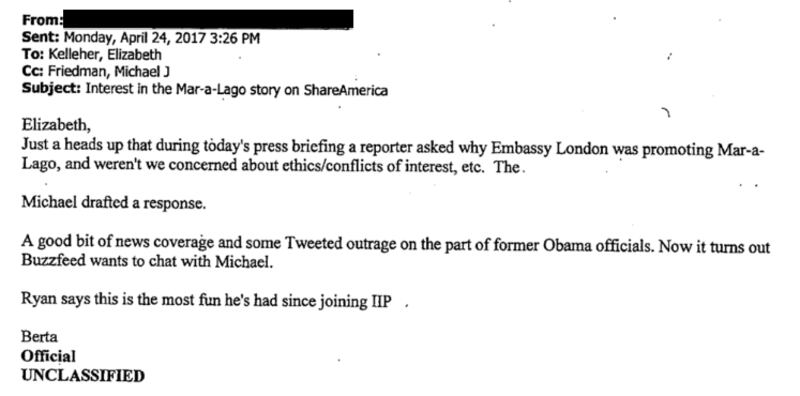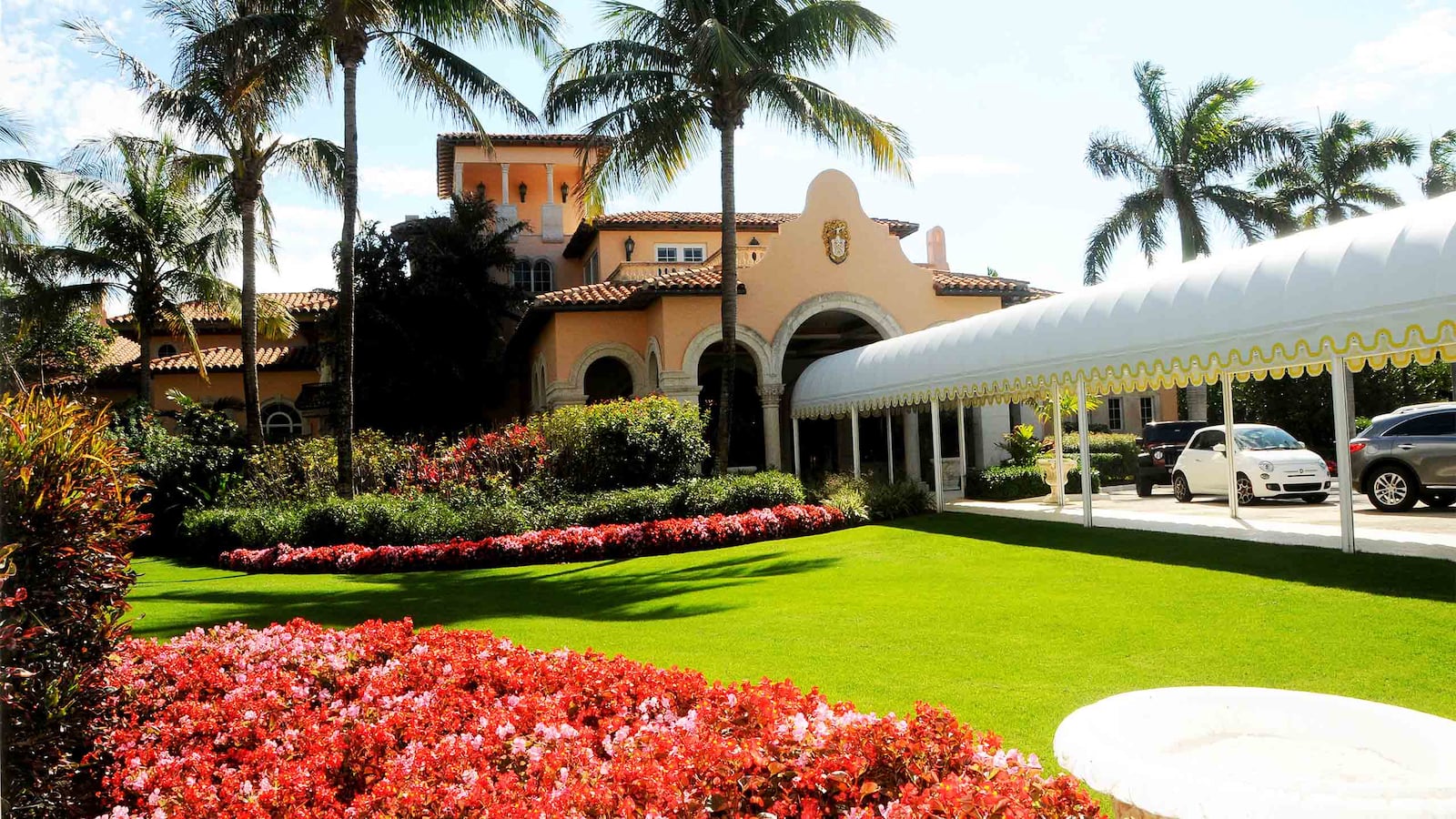When the State Department published a glowing profile of President Donald Trump’s “winter White House” at Mar-a-Lago in April, they thought it would be a mundane bit of content that might attract a few foreign readers to U.S. embassy websites. Instead, staff found themselves embroiled in a heated controversy over the use of government resources to promote the president’s private business interests, according to a review of internal emails.
The post from ShareAmerica, a news and information division of the State Department, provided a brief history of the Mar-a-Lago property and noted Trump’s use of his club early in his presidency to host high-level meetings with foreign leaders.
“By visiting this ‘winter White House,’ Trump is belatedly fulfilling the dream of Mar-a-Lago’s original owner and designer,” the post read.
It took nearly three weeks for the post to gain much attention. But when it did, the backlash was swift. In late April, a reporter at the State Department press briefing asked why the department was using government resources to promote the president’s business. The story quickly picked up steam, and ShareAmerica staffers, initially tickled that their work was getting far more attention than usual, quickly realized that it was ballooning into a larger, more serious, controversy.
“It is my genuine concern this situation over the Mar-a-Lago story is going to mushroom beyond any reason and innocent people are going to be hurt,” wrote one ShareAmerica staffer as coverage of the Mar-a-Lago post intensified.
The initial theory surrounding the origins of the post was that it was done at the behest of someone close to the president as a means of advertising his crown-jewel property. But internal emails and talking points obtained through a Freedom of Information Act request don’t provide evidence of that. Instead, they show that ShareAmerica did not receive any direction from the White House or guidance from ethics lawyers before the post went live. Indeed, staff didn’t seem to consider questions about the ethicality of the post at all.
The resulting uproar shows the potential pitfalls for an administration led by a career businessman who has refused to fully divest himself of private endeavors that could benefit from his government service.
Trump charges members of his Mar-a-Lago club hundreds of thousands of dollars annually, and financial records show that his income from the club—which hiked its member dues by $50,000 this year—more than doubled from 2014 to 2016.. Trump has placed his business entities into a trust, which his two adult sons oversee. But conflict of interest questions continue to dog his presidency.
"President Trump's refusal to divest from his business empire creates endless possible conflicts of interest, and unless agencies take steps to stop the president from profiting from his position, this type of thing is going to happen again,” said Melanie Sloan, a senior advisor to the group American Oversight, which obtained the internal records via a FOIA request, in a statement to The Daily Beast.
Those internal records show that the Mar-a-Lago post had been in the works since late March, and staff considered it simply the newest installment of its series about U.S. presidents and elements of their personal lives. ShareAmerica generally syndicates its content on the websites of US embassies abroad, and staff there were skeptical that a piece on an expensive Florida club would lead to any financial benefit for the club or its owners.
“The audience for ShareAmerica is a foreign audience that would not be expected to join a private club. This is not written for Americans,” wrote Elizabeth Kelleher, the head of State’s International Information Programs (IIP), which oversees ShareAmerica, in an internal email. The “winter White House” post, she wrote to a colleague crafting a press statement, “noted that the club charges members dues, which is a simple fact. In no way did it encourage membership. It is false reporting to indicate otherwise.”
Whether or not it encouraged membership, the post did promote a private business that the president still owns. Media coverage to that effect was widespread, catching staff off guard.
“Just a heads up that during today’s press briefing a reporter asked why Embassy London was promoting Mar-a-Lago, and weren’t we concerned about ethics/conflicts of interest, etc,” wrote a ShareAmerica employee to superiors at IIP. She added that there had, initially, been “a good bit of news coverage and some Tweeted outrage on the part of former Obama officials,” though outlets—specifically Buzzfeed—were asking questions.

A colleague at ShareAmerica, that employee added, “says this is the most fun he’s had since joining IIP.”
Within hours, that fun had dissipated as State realized the controversy was spiraling out of control. Staff at Foggy Bottom were also caught totally off guard, and Jennifer Hazelton, then a senior State Department public affairs officer and former Trump campaign aide, quickly sought information from IIP about how the post came together.
ShareAmerica quickly removed the post from its website— though an archived version is still available—and replaced it with a brief note that read: “The intention of the article was to inform the public about where the president has been hosting world leaders. We regret any misperception and have removed the post.”
Meanwhile, staff at IIP scrambled to put together talking points centered on downplaying the White House’s knowledge of the post. “As a general matter, lIP content generated for ShareAmerica is not reviewed outside of IIP,” one draft of the talking points noted. “Moving forward, we will consider whether any additional review of this content is appropriate.”
But Sloan says it’s not clear to her group, a nonprofit ethics watchdog, that these types of issues have been adequately sorted out. Nor is it apparent that there won’t be similar promotions of Trump business interests in the future.
"Months after the State Department used taxpayer resources to promote a Trump property, we still have no clear answers about why this happened, and the State Department has established no guidelines to prevent employees from advertising the president's businesses in the future,” Sloan said.





